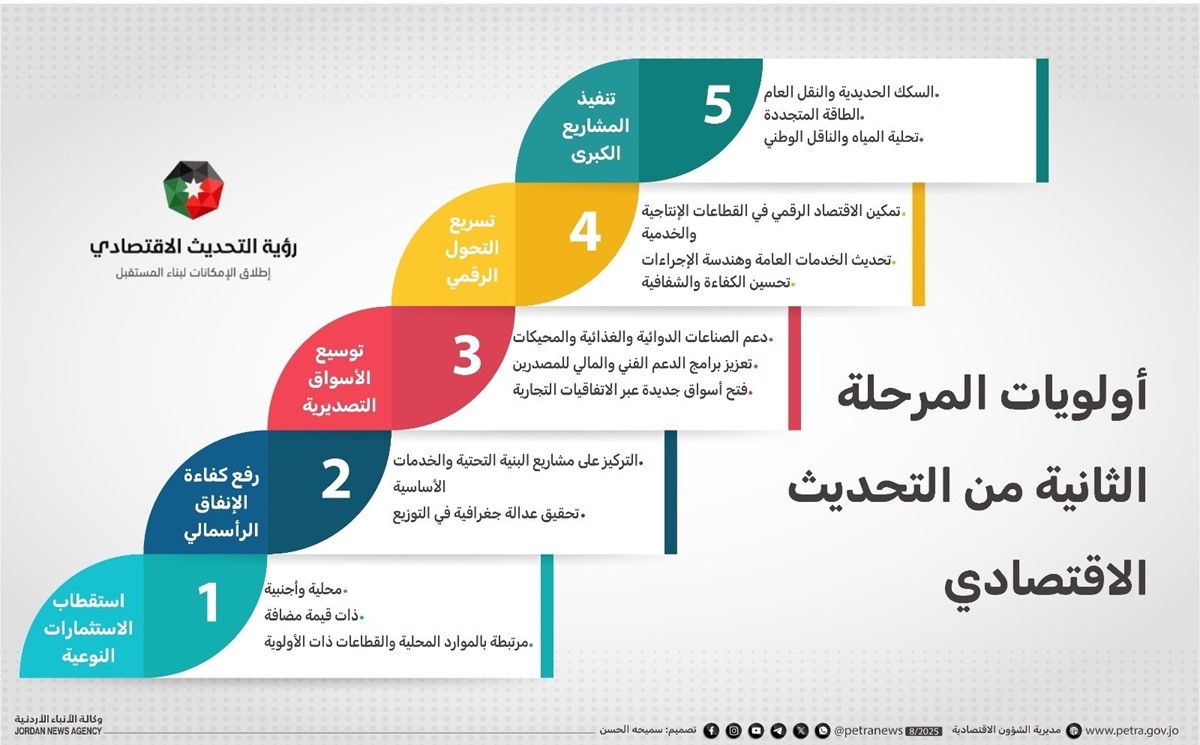Amman — Since the beginning of this year, Jordan has witnessed significant economic momentum, setting the stage for the next phase of its economic modernization vision, seen as a gateway to sustainable growth and comprehensive development.
اضافة اعلان
As official efforts accelerate to finalize the upcoming executive program, economic experts told the Jordan News Agency (Petra) that this second phase requires clear priorities focusing on attracting quality investments, enhancing capital expenditure efficiency, expanding export markets, and implementing major projects.

They emphasized the need to speed up digital transformation and empower the digital economy as key drivers to improve efficiency, simplify procedures, and create new opportunities—especially amid the rapid growth of technology- and innovation-related sectors.
Nisreen Barakat, Executive Director of the Jordanian Strategies Forum, highlighted that achieving the economic vision fundamentally depends on attracting foreign investments and encouraging local investments—particularly high-value, knowledge-based ones linked to Jordan’s sectors and resources. These are key to driving economic growth and providing decent job opportunities for youth.
Barakat stressed expanding capital spending on infrastructure and essential services that affect citizens’ daily lives, continuing public sector modernization, simplifying procedures, and creating an attractive business environment that fosters creativity and excellence for investors and citizens alike.
She noted that boosting economic competitiveness requires the private sector to adopt modern technologies in production, focus on high value-added manufacturing, offer quality advanced services, increase export volumes, and expand export markets.
Barakat also pointed out that realizing these ambitions requires joint efforts from the public and private sectors, civil society, and academia—each playing their part. Genuine development results from collective work and shared will.
Engineer Fawaz Al-Shakka, representative of the handicraft industries sector at the Jordan Chamber of Industry, stated that in light of the government’s approach to finalize the executive program and positive indicators witnessed since the start of the year, the coming phase demands a strong focus on priorities that maintain momentum and achieve national development goals.
Al-Shakka highlighted the urgency of accelerating major growth- and employment-stimulating projects, especially infrastructure projects like railways, intercity public transport, renewable energy, and water desalination.
He underscored the importance of supplying industrial cities with natural gas to reduce production costs, improve national industries’ competitiveness, and attract new investments to industrial zones.
Al-Shakka confirmed the need to support productive export-oriented sectors, led by industry, through lowering production costs, improving the business environment, and developing supply chains. He emphasized focusing on priority sectors identified in the vision, such as pharmaceuticals, food industries, and cosmetics, which have real growth potential and opportunities to enter new markets, especially under existing trade agreements.
He stated, “Supporting industrial and national exports is a strategic priority, whether through expanding technical and financial support programs for exporters, opening new markets, or enhancing external promotion tools. Enhancing export competitiveness directly impacts growth, employment, the balance of payments, and contributes to diversifying the production and economic base.”
Al-Shakka reaffirmed the need to accelerate digital transformation and empower the digital economy to improve efficiency, facilitate procedures, and generate new opportunities amid the rapid growth of technology and innovation sectors.
He added that the success of the upcoming executive program depends on transparency, governance, accountability, and private sector involvement to ensure diligent follow-up, continuous evaluation, and timely correction. The economic modernization vision is a comprehensive national project whose success is a necessity for Jordan’s future, requiring joint work and full commitment.
Dr. Raad Al-Tal, head of the Economics Department at the University of Jordan, said sustaining the economic improvement since the start of the year requires focusing on key priorities, foremost of which is redirecting capital spending toward productive and strategic projects that directly support growth and job creation.
He noted the importance of gradually increasing capital spending to 6% of GDP, as current rates remain low. He stressed the need for geographic equity in distribution, raising provinces’ share to at least 25%, to promote local development and economic balance across the Kingdom.
Al-Tal emphasized directing resources toward promising priority sectors within the vision, such as entrepreneurship, the green economy, and social protection, which currently receive very limited capital spending. He also called for a qualitative shift in capital spending management, from mere budget allocations to a strategic tool leading the transition to a productive and sustainable economy, requiring effective institutional coordination and continuous assessment of public spending’s developmental impact.
Economist Dr. Hazem Al-Rahahleh, who is also Director-General of the Jordan Chamber of Industry, said Jordan is now “at a stage that calls for building on achievements at macro and sectoral levels and giving a real boost to measures capable of unleashing various productive and service activities.”
He stressed the importance of seriously reviewing regulatory and procedural challenges that might slow down the positive growth momentum and opening a responsible dialogue to find urgent and effective solutions.
Al-Rahahleh said the priorities set by the economic modernization vision deserve full attention and require responsible engagement from all components of the national economy—public and private sectors alike.
He pointed to the need to focus on measures with broad impact affecting many beneficiaries, whether through policies supporting productive and service sectors or those directly linked to citizens’ daily needs. He emphasized the importance of generating quick, tangible results in the short term alongside longer-term strategic goals. Major projects like water desalination, the national water carrier, and railways represent strategic levers that must be expedited.
He also called for giving high importance to upgrading the logistics system—both local and those connecting Jordan to global markets—viewing it as a critical enabler requiring exceptional priority and tools beyond traditional frameworks.
Regarding services, Al-Rahahleh said accelerating the development of services provided to citizens and residents is essential, ensuring their effectiveness matches user expectations rather than traditional delivery patterns. He noted that digital transformation is no longer optional but a fundamental enabling tool.
—(Petra)






